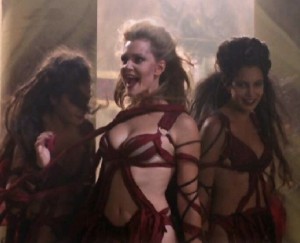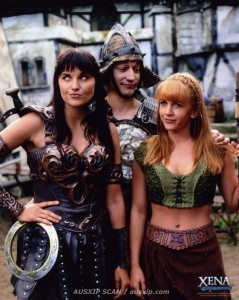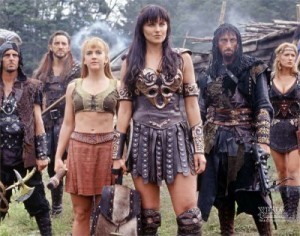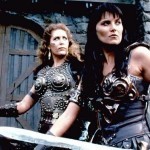Tansy Rayner Roberts's Blog, page 147
February 2, 2011
Burn Bright Book Trailer
I've mentioned here and there how excited I am by the upcoming release of a YA paranormal novel by my good friend Marianne De Pierres: Burn Bright. Check out her trailer!
Strong Books Make Strong Girls
The title from this post is quoted from one of the comments in the threads over at Bitch Magazine – which I think is the best evidence I can give that it's not all hysteria and piling-on. There's some marvellous discussion and some really thoughtful posts over there, even if it's slowly being lost among the noise as more and more people join the conversation.
It's always disappointing when you're in the middle of a conversation that to you seems quite robust and interesting, and the people around you suddenly start complaining that it's too noisy, and asking questions like 'why is this even important?' and 'why are you so angry?' It reminds me of how many people dismissed RaceFail as a lot of people shouting at each other and getting everything wrong on both sides, and that it hadn't achieved anything, while the group of people who had been all inspired and had their brains turned inside out and were making exciting plans to make the world better all blinked and went, "Excuse me?"
Conversations, sometimes, are noisy. Especially for those who came in late. So for those of you who did, here are some of the blog responses to the Bitch Magazine Thing.
In short: a magazine recommended some books. A couple of these books raised red flags with commenters – I believe roughly one commenter per book, though we were told there were also some emails. Three books were removed from the recommendation list for not being feminist enough, different reasons each time. And the internet went crazy.
Except it didn't go that crazy. A lot of things were said, and many of those things were very important. It's not about censorship, entirely, though that word is being flung around a lot (mostly by people who are saying 'it's not actually censorship'). But it is about the misrepresentation of books, about taking a single scene or excerpt and placing a really powerful and negative interpretation on that scene. No books have been banned, and yet, as Maureen Johnson pointed out, this is exactly HOW books get banned. This is the process, and the mindset that lets that happen.
So here we are, typing our brains out, defending books, because that is what we do. If Bitch Magazine had chosen not to recommend a few books that would have been fine, but because they recommended the books and then took that recommendation away, their reasons for doing so take on this huge weight, and it's distressing to see that people will in fact walk away from the conversation believing that Tender Morsels is a book about rape as revenge (hint: it's not) and Sisters Red is a book about rape culture (I haven't read it, though I plan to, but many people have been distressed by this characterisation of the book as there is no rape in it) and Living Dead Girl as "torture porn" (again, I haven't read it, but several commenters were very upset by this characterisation of the book).
This is a very roundabout way of saying that I have gathered some links of blog posts on the matter by a variety of smart people! It really is worth going back to read the comments on the original Bitch list because there are some marvellous ones – Penni Russon, Paolo Bacigalupi wrote two of my favourites, but there are also some excellent contributions from writers, readers, librarians and rape survivors. On the other hand, they are past 200 posts now and some of them are on the flaily or the 'what are you all on about' side, so I understand people choosing to give that a miss. [worth noting for those of you who take a deep breath before reading comments that they allow anonymous commenting and there isn't a lot of moderation going on, though they are trying their best to jump in when threads turn antagonistic or abusive]
One of the first blog entries I saw on this after the first Twitterstorm began to calm off was Kirstyn McDermott's elegant defence of Tender Morsels, which does a very good job at addressing the interpretations placed upon that text over at the Bitch post.
Margo herself also addresses those criticisms of her book and I think does a very good job at it considering that an author defending her text is not a happy position to be in.
Karen Healey wrote up her own list of recommendations of great feminist-friendly YA books which she has read, and found on her own shelves. There has been a lot of snark about the representatives of Bitch Magazine and the degree to which they had read the book that they were recommending in the first place, and I think this is a fair criticism – one of the largest concerns in this discussion is that the list itself, which is full of quite marvellous, important, excellent books, had lost credibility due to the swapping out of titles, and apparent easy acceptance of only a small handful of criticism. Given that the best thing to come out of this conversation is people finding out about books they might want to read and share with others, I think Karen's response is a very positive one.
Liz B gives a librarian's perspective here, and in particular raises concerns with the way that reviews criticising aspects of the books are being used and indeed misused to push a particular reading of the text. The comments on this one are very thoughtful and inquiring.
SB Sarah also posted what I thought was a very good piece about Tender Morsels and the whole situation, and particular her disappointment in Bitch Magazine, as a publication she had a strong emotional investment in. Sadly the comments to this post did degenerate somewhat, and are an example of how frustrating it is when an internet topic turns into an echo chamber.
Some other excellent in depth responses to this topic are Colleen Mondor, Bookalicio.us. Shorter posts from Holly Black, Alisa Krasnostein and John Scalzi.
Abigail Nussbaum has also written a critical post on the topic, looking at it from many angles. I'm not in agreement with all her points – I definitely agree that there's been a lot of unfortunate misinformation floating around the topic, but I also think there's a lot more intelligent discussion going on in comments threads, blog posts and even on Twitter than she gives us credit for. This is especially the case for the comments on the original Bitch post itself – while there are many I find frustrating, annoying or just plain WRONG, I was also really interested in many of the perspectives expressed there, and among other things am now very keen to read Sisters Red, which I hadn't heard of before the controversy, and which sounds exactly like the kind of book I love to read. Fairy tales, sisters, and clever use of opposing POVs!
The conversation may be noisy in places, but a lot of that is the sound of smart, informed readers going CRUNCH CRUNCH CRUNCH while talking about books and feminism. Which is kind of awesome.
Galactic Suburbia #25 Show Notes
There's a new episode up! Grab it from iTunes, by direct download or stream it on the site.
EPISODE 25
In which we hit and run the Locus Recommended Reading List, tackle e-books and piracy, and delve into the knotty issue of religion in science fiction.
News
Locus Recommended Reading List – hot off the press!
Philip K Dick shortlist
First annual Geek Girl Con in Seattle – would this work in Australia?
Cloud-delivered ebooks from Readings/SPUNC
Response to comments on the internet about the Cloud Publishing
"we proudly declare that we stream your ebooks — you don't have to download them. You can of course download your Booki.sh books for offline access on most devices — you just can't read them in anything other than Booki.sh."
SPUNC Response: "Digital publishing presents us with a massive opportunity that has heretofore been unavailable. Namely this: that a publisher can have a book distributed wherever they want, at the click of a button".
Discussion of ebook piracy
As Jim Hines found out the world is not the USA and the rest of the world does not experience publishing nor this ebook revolution apace with the USA. (Hines' original post)
Charles Tan presenting the perspective from Elsewhere In the World
Karen Healey: I was wrong and I'm sorry
Weird Tales revamp
Launching new website; editor-in-chief Ann VanderMeer and publisher John Betancourt have raised the pay rate to 5 cents per word; and implemented a new submissions portal for potential contributors. In addition to the announcement late last year of the all female editorial team, for the first time in 88 years of Ann VanderMeer, Paula Guran and Mary Robinette Kowal.
Feedback
Sean, Thoraiya, Niall
Pet Subject
The place of religion in science fiction.
Modern religions, made up religions, machine religions… or no religions? What place can/does/should religion play in sf?
Jo Walton on religion in SF!
Please send feedback to us at galacticsuburbia@gmail.com, follow us on Twitter at @galacticsuburbs, check out Galactic Suburbia Podcast on Facebook and don't forget to leave a review on iTunes if you love us!
February 1, 2011
Tender Morsels: Not Bitchy Enough
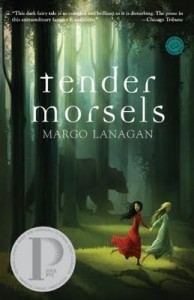 Bitch Magazine posted a list of 100 Young Adult Books for the Feminist Reader, which is a great thing, and it's a fantastic list featuring a lot of really good books, and quite a bit of speculative fiction. The list included Tender Morsels, by Margo Lanagan, which you might recall I think is a really good book. So, hooray!
Bitch Magazine posted a list of 100 Young Adult Books for the Feminist Reader, which is a great thing, and it's a fantastic list featuring a lot of really good books, and quite a bit of speculative fiction. The list included Tender Morsels, by Margo Lanagan, which you might recall I think is a really good book. So, hooray!
Except that, in response to a single commenter on their list who objected to the use of "rape as vengeance" in a scene in the book, the people behind the Bitch list reread the book and decided to remove it from the list, along with two others that had received complaints.
Several authors and readers, including Margo herself, have objected to this over Twitter. Some tweets have included:
@margolanagan Can't quite believe this, but Bitch Magazine appear to have caved in and REMOVED TM from their 100 books list. http://tinyurl.com/4jx2qgd
@maureenjohnson Dear @BitchMedia, please put Tender Morsels back on the feminist YA list. You were right the first time.
@scottwesterfeld My comment on the @BitchMedia 100 Feminist YA Books do-over: http://tinyurl.com/499qdgr
@maureenjohnson Additional to @BitchMedia, please reconsider this position or please remove my book as well. @MargoLanagan is a great feminist author.
@Gwenda By the way, immediate outcry and rally against @BitchMedia's actions? Just one reason the YA community rocks. #justsaying
@JonathanStrahan Is it just me, or does it sound like no-one at @bitchmedia has read any of the books on their own list?
@ColleenLinday Incredibly disappointed in @BitchMedia for removing both LIVING DEAD GIRL & TENDER MORSELS from this list: http://bit.ly/gbCsgO #growapair
@dianapeterfreund pausing in quest to soothe teething infant to request my novel be removed from @bitchmedia's "safely feminist"list #bitchplease
@sarahockler: Your job is not to protect us from literature. Help us discover it. Engage us in conversation & debate. #bitchplease #speakloudly
(PS: the hashtag is awesome, guys, until you click it and realise how many people use the same hashtag WITHOUT IRONY. Ick.)
Scott Westerfeld, Maureen Johnson, Justine Larbalestier and Diana Peterfreund have all requested that their books be removed from the list, in protest to the removal of Tender Morsels.
It really surprises and disappoints me that Bitch Magazine were so lacking in belief in their original choices that they caved and removed these books at the first hint of controversy, rather than letting them stand and allowing discussion about these books to continue. I find it a little boggling that "moral ambiguity" is presented here as a negative, instead of the sort of thing that literature is supposed to do.
I commented on the removal myself:
I don't think the book validates the use of rape as vengeance at all, and I fail to see how anyone would come away from the scene in question thinking that this is portrayed as a good thing.
This is a very skewed, shallow reading of one of the most important fantasy novels of the decade.
The reasons given for the books removed seems to have been through worry that the titles were not quite feminist enough, which suggests a really problematic attitude to feminist literature: that only books which contain 100% feminist theme count, perhaps? An awful lot of excellent, important feminist literature is also problematic. Most really crunchy books are, in one way or another.
I really like Diana Peterfreund's comment about "safely feminist list". The books chosen to replace those withdrawn are very safe choices: a Diana Wynne Jones, a Robin McKinley, and a John Marsden. All really great books, and yet none of them have as much to say as Tender Morsels.
Tender Morsels is a hard book, a difficult book, and it simply drips with moral ambiguity. If you don't think it belongs on a YA recommended reading list, that's your choice, but don't be brave enough to put it on there, and then flick it off the second someone remembers that there are some icky bits in it.
UPDATE: There are some amazing comments over at that list and they're just getting better.
January 31, 2011
Writer Crazy and Stranger than Fiction
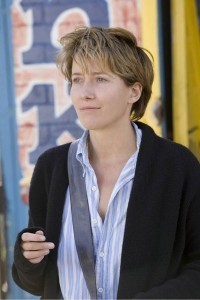 The weird thing about having a subscription to Bigpond Movies (similar to Netflix in the US I think, only with discs posted to you instead of downloads cos we don't have the broadband speeds yet) is that I add movies to our list when I think about it and then, a year later, I find movies have been posted to me by my past self, and I have no idea what they are or why I thought they would be interesting.
The weird thing about having a subscription to Bigpond Movies (similar to Netflix in the US I think, only with discs posted to you instead of downloads cos we don't have the broadband speeds yet) is that I add movies to our list when I think about it and then, a year later, I find movies have been posted to me by my past self, and I have no idea what they are or why I thought they would be interesting.
It really doesn't help that they turn up in a plain white envelope with no COVER.
This was the case with Stranger Than Fiction. Was that the one that was a bit like Adaptation? I couldn't remember. But for once we actually felt like watching a movie together, and put the disc in, and that was when it hit me. This is the movie with Emma Thompson as the personification of writer crazy. AWESOME.
Writer crazy, for those of you not aware of the technical term, is all those weird things that writers do and no one else does, like googling methods for how to dispose of a body, or leaping on NASA astronauts at parties in order to check key plot/character details with them, or sobbing uncontrollably for hours because we just had to kill that character and we miss them already.
Stranger than Fiction is way better than I thought it was going to be, especially for a film that has Will Ferrell at the centre of it. It's about a tax auditor whose life is being narrated by a plummy British accent (Emma Thompson) and who starts to become aware of that narrative voice, and understandably freaks out when it foretells his death.
(some SPOILERS follow for the film though not the ending)
 Meanwhile, there's a subplot in which an author (also Emma Thompson) is struggling with how to kill off her latest hero, in a book which is way overdue to the publishers. She constantly imagines death scenarios for herself, smokes like a chimney, and does things like going to hospitals and gravely asking "where the dying people are" because the emergency department is saving too many lives and it's just not inspirational enough.
Meanwhile, there's a subplot in which an author (also Emma Thompson) is struggling with how to kill off her latest hero, in a book which is way overdue to the publishers. She constantly imagines death scenarios for herself, smokes like a chimney, and does things like going to hospitals and gravely asking "where the dying people are" because the emergency department is saving too many lives and it's just not inspirational enough.
There are other bits of plot. There's a truly charming romance between Auditor Guy and Maggie Gyllenhaal, a tattooed baker who refused to pay the portion of her taxes that the government was going to spend on war, and introduces him to the wonder of just-baked cookies. There's an equally charming relationship between Auditor Guy and a crusty literature professor (Dustin Hoffman) who is determined to solve his problem by figuring out what book he's in – the ready acceptance of this professor that a guy is really hearing his life being narrated is completely believable if you know anything about academics. Obviously he's putting off the marking.
But ultimately the whole point of the story is the bringing together of character and author. The scenes in which they speak for the first time and meet are charged with energy, and the final act of the film, which is basically about how books are more important than people, is really powerful. I won't describe more, because I don't want to completely spoil the film experience.
I have a bit of a problem with authors depicted in film. It's similar to my problem with authors depicted in the media – you have writers of one kind who have a complete misunderstanding of how writers of another kind conduct their lives. If you listen to journalists, all authors get million dollar contracts in exchange for brief moments of inspiration and a few typing montages, and as long as you get a Great Idea, all the work is easily and romantically achieved.
Likewise, if you listen to screenwriters, all novelists are critically acclaimed and spend most of their time suffering writer's block, staring at walls and not nearly typing enough. All typing and indeed creative work is done on old fashioned typewriters, and no one ever makes a back up copy. This usually leads to (the one Film Author cliche that didn't appear in this book) the lake/fire scenario, whereby a manuscript someone has slaved over for years is destroyed or lost through an act of irony. Yes, Colin Firth, I'm looking at you. And the biggest problem is of course that when we actually hear their prose, they turn out to not be very good writers, despite the plot informing us how brilliant they are.
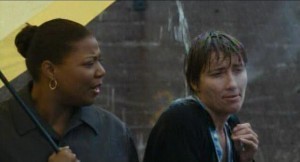 Emma Thompson's Author character in Stranger than Fiction embodied many of the Film Author cliches, though her performance of Writer Crazy was creepily authentic. Sure, most writers don't spend their days staring at bridges and imagining car accidents, but um… sometimes we do. She's a caricature, but a horribly familiar one. She represents the very worst days of Writer Crazy, when it's just not worth getting out of your pyjamas until you've killed a fictional person.
Emma Thompson's Author character in Stranger than Fiction embodied many of the Film Author cliches, though her performance of Writer Crazy was creepily authentic. Sure, most writers don't spend their days staring at bridges and imagining car accidents, but um… sometimes we do. She's a caricature, but a horribly familiar one. She represents the very worst days of Writer Crazy, when it's just not worth getting out of your pyjamas until you've killed a fictional person.
Sadly, as it turns out, she's kind of a hack. The genius novel she's writing actually only has a short story's worth of plot, because it's the same as the movie only without the interesting bit (where he hears the narrative and reacts, and it doesn't have Dustin Hoffman in it, who gets most of the best lines). We are informed gravely that she has made her career on writing novel after novel in which the main character dies. And that this work, which does exactly the same thing, is her masterpiece. Also, her words wouldn't be nearly as impressive if they weren't being read out in Emma Thompson's fruity vowels.
Basically, if anyone was remotely skeptical about how that mysterious beast called Literachur actually works, this would confirm their worst fears.
Then there's that scene, the one the whole film is constructed around, in which an author comes face to face with her own protagonist, and he begs her not to kill him. It's strong, yes, and emotional, and surreal, but I couldn't get over the fact that I wrote this scenario in a short story when I was sixteen, and I'm pretty sure most writers in the world did the same thing.
What did excite me, while watching the movie, was that it had Emma Thompson in it. That sounds a bit trite, I'm sure, though I defy you to find a movie that isn't much improved from having Emma Thompson in it. But the really cool thing is that there is a part for her in this movie. It's so rare to find really good, interesting roles for 45 year old women in movies, and even rarer once you discount the mothers and the token aging glamour queens. The awesome thing about this role is that it didn't even need to be played by a woman. You could have Alan Rickman playing the cranky chainsmoking Crazy Writer and you wouldn't have to change more than a couple of words, but suddenly the movie would be All About Men. Instead we have a very cool movie which features Emma Thompson as an intelligent, driven career woman, whose talent is so great that she is allowed to act like an asshole, and she isn't expected to wear lipstick.
If you give me Emma Thompson snark, in other words, I will stop rolling my eyes about typewriters and hackery, and pay attention.
Well, okay, that's a lie. I will always roll my eyes. But I do it with love.
January 28, 2011
Lunatic with Lethal Combat Skills [Xena Rewatch 3.1-3.4]
Season Three is upon us! Is it me, or is Gabrielle's top getting tinier? Also, her boots this season are awesome.
Unlike last season, which ran through a few 'meh' episodes before hitting its stride, season three opens with a bang, presenting us with a powerful story that shows Xena in a whole new light, and potentially adds a whole lot of baggage to her mythos, while drawing a sharp line under one previously important element of her backstory.
Ares, that sexy snarky bastard, sics the Furies on Xena. Reimagined as a trio of New Romantic stripper babes with spiky hairdos, the Furies curse Xena with madness until she brings justice against a member of her family whose death was never avenged: her father.
The madness plotline is where the story could really have gone off the rails. Indeed it looks at first like they are going that route, with Lucy Lawless enacting her "madness" in a manic eyerolling, pantomime style. They make up for this unpromising start with some quieter scenes between Xena and Gabrielle as Xena tries to make sense of what is happening to her, and particularly where Gabrielle takes on the role of carer to her confused, hallucinating friend.
It is worth noting that, as with Callisto, Xena's state of sanity/insanity is conveyed through the degree to which her hair is unbrushed.
It's interesting that the production team decided to retroactively kill off Xena's father, whom she always believed had left the family when she was young. Even more interesting is the revelation of who killed Daddy – Xena's mother confesses quietly to the crime. The story is a classic Greek myth, then, with Orestes son of Agamemnon referenced – his situation was similar to Xena's, and his story ended in great tragedy.
The clever part to this story, as Xena rants, rolls, threatens suicide and is enthusiastically corrupted by Ares, is that there is an element of Oedipus the King in here too – specifically, the way he plays the part of history's first literary detective, working out the crime through the testimony of witnesses. Even when crazy, Xena is sharp as a sword, and the whole situation crashes towards one of the show's most iconic scenes, in which a deranged Xena completely lawyers the Furies, convincing them and the audience that her real father is in fact Ares.
The episode is utterly convincing on this score. But – Ares, Xena's father? Really? Once her sanity has returned, Xena makes it clear to Ares that she was lying to convince the Furies and doesn't really buy the idea that he is her father. Indeed, the issue is never mentioned again – but it's left up to the individual viewer to decide for themselves whether it's true.
For myself, while I am intrigued by the idea of Ares being Xena's father and the entirely squicky angle that adds to his attempts to seduce her over the next four years, I don't want it to be true. The awesome thing about Xena is that she is not half god – her powers and skills are her own, and she has created her own identity as a great warrior. I don't want her to be just another Hercules, in the shadow of a godly parent. The fact that she can kick Ares' leather-clad arse is so much more excellent if she is entirely mortal, even if it's a touch improbable.
Simply one of the best standalone Xena episodes ever. By now you should be used to this show's habit of taking a trope used by every other SF/Fantasy TV show and putting a special Xenaverse spin on it. This is the Groundhog Day episode. It completely suckered me the first time around, killing Joxer in a street fight three minutes in, and having our heroines grieve for him before the opening credits roll. It's memorable also for forcing Xena to grieve for Argo, and for Gabrielle. I completely can't hear the words 'rise and shine' without remembering this one!
Apart from the fact that "Groundhog Day" is an excellent plot that enables you to explore character in all kinds of interesting ways, one of the cool things about this one is that again we get to see our heroine using her brain, playing Great Detective. Her eventual solution to needing to be in several different places at once, involving a mixture of psychology and geometry is ingenious, impossible and very, very Xena.
It's also one of the best pieces of evidence that Xena comedies work best when Xena herself is deadly serious, with occasional outbursts of snark, Emma Peel eyebrow lifts and impulsive violence.
Her bwahaha moment at the end also proves my point, but from the other direction.
PS: This one is all Cupid's fault. He is basically stalking Xena at this point, though never actually appears.
This is another 'Xena gathers a gang of bad bad people together for a nobleish cause' caper – one I really loved the first time I was watching this season. It doesn't hold up well, sadly. The central romance between an angry man-hating feminist slaver and a hunky alpha male gladiator (yes, really) is dreadfully trite, and the whole script is full of painful dialogue. What works, as ever, is Ares (it's now a tradition to shoot him on the diagonal, possibly to make the actor look taller) being wicked and trying pathetically to replace Xena with a warlord who isn't fit to spit-polish her breastplate.
In this case, we have Agathon, a stringy-haired youth armed with super-powered armour made by Hephaestus. And you know, there's lots of running around and shouting and Xena's new allies all trying to kill each other. The best bit, the jailbreak of Xena's allies, is explosive and fun.
The point of the episode is very clear: this is a group of people who were Xena's protegees in the old days, and whom she shaped into very bad people. Gabrielle quite rightfully asks some tricksy questions about this – namely, what would have become of her if she had followed Xena in those bad old days? While the questions are given serious attention, they aren't really answered beyond the obvious – duh, Xena wouldn't have looked twice at her back then.
Xena's history is never forgotten, and is always coming back to bite her. You could certainly argue that she does far more to acknowledge, own and repay her debts from the past than other villain-redeemed TV shows such as Angel who got off pretty lightly thanks to the whole soul/not soul division of actions.
The badass feminist manhating slaver Glyphaera is played by that woman who was a vet on Home and Away once. I used to know her character's name off by heart, and feel a little sad that I no longer do. Shame about the dodgy Californian accent.
This is the first episode of "the Rift" arc which dominated season three. It's this story arc which really saw Xena come of age as a show, with the production team bold enough to shake their formula to the core, and to allow both their female leads to come into drastic conflict. For a show that is very much about female independence, it fascinates me that they used maternity as the theme to create antagonism between Xena and Gabrielle, setting it up as the one tie that is more important than that between the two of them. It is to the show's credit that it survived such a harsh emotional arc which pushes both women to the brink of wanting to kill each other – not due to a misunderstanding, or cosmic interference, but because they have legitimate cause to hate each other – and then to resolve it so they can continue their friendship, more deeply than before.
It could have gone so terribly, terribly wrong.
But I digress! All I remembered of this episode was pretty much the last five minutes, which is the part relevant to "the Rift", and had entirely forgotten that it centres around Boadicea as well as the return of Caesar. Boadicea is one of a long line of powerful female characters who have a history with Xena, and whom Xena has come to appreciate differently now that she is a more loving and caring person.
The Queen of the Britons is here played magnificently by Jennifer Ward-Leland, a New Zealand theatre/TV actress who also happens to be married to Michael Hearst (Iolaus and later a regular director on both Hercules and Xena). Ward-Leland brings a great gravitas to Boadicea, and beyond her great performance I enjoyed the fact that she is a statuesque older woman. It is always nice to see glamour roles played by women who aren't stick thin or under 25, and to be fair this is something Xena did excellently.
Xena's friendship with Boadicea has barely weathered the storm of her past betrayal, and the two women work together though they still do not trust each other, to bring down a common enemy: Caesar. Their interactions are rocky and at times violent, though ultimately they do work amazingly together and the chemistry between the two characters is fantastic.
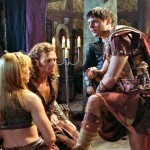 Caesar is in good form again, repeating some of his catchphrases mantra-like and strutting around Britannia like an armoured peacock. Watching the look on his face as Xena and Boadicea get the better of him on the battlefield is totally worth the price of admission.
Caesar is in good form again, repeating some of his catchphrases mantra-like and strutting around Britannia like an armoured peacock. Watching the look on his face as Xena and Boadicea get the better of him on the battlefield is totally worth the price of admission.
But of course, all of this is one glorious, clever, distracting red herring. The story isn't about Boadicea and Caesar at all, though it will be very significant that Xena came to Britannia out of anger, to get revenge on the man who betrayed her. The real story has been happening in the quiet moments between Gabrielle and the burly Celtic priest who brought them to this country – a priest who worships one god.
We've seen this before. It's an allusion to the Christian/Hebrew god, and that means the priests are gentle and trustworthy, right? Right? Only, too late, Gabrielle discovers that they weren't talking about "the god of the Israelites" at all. There's another god whose followers claim him as the only one, and we're suddenly at sea, far from Christian mythology… well. Ish.
The god in question is Dahak, and his followers manage to force Gabrielle into a situation where she has to take a life. There is blood on her hands, and as the episode closes, she weeps uncontrollably in Xena's arms, knowing that nothing will ever be the same again…
How right she is.
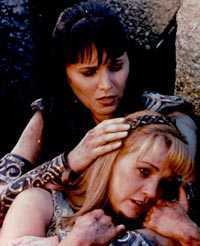 The emphasis on Gabrielle's "blood innocence" which has been alluded to regularly since she joined Xena, is finally paid off in the powerful close to this episode, where her innocence is used as a sacrifice to an "evil" god we have never heard of before. These events and those which follow will have repercussions with Gabrielle and her journey over the next two years, as she struggles to make sense of her place in a violent world, and how she can come to terms with sharing Xena's life but not her casual attitude about sticking swords in people.
The emphasis on Gabrielle's "blood innocence" which has been alluded to regularly since she joined Xena, is finally paid off in the powerful close to this episode, where her innocence is used as a sacrifice to an "evil" god we have never heard of before. These events and those which follow will have repercussions with Gabrielle and her journey over the next two years, as she struggles to make sense of her place in a violent world, and how she can come to terms with sharing Xena's life but not her casual attitude about sticking swords in people.
The creation of Dahak as villain is an interesting one. Up until now, in the Herc-and-Xenaverse, they have been content to use "real" gods, mostly from Greek mythology, as antagonists. Ares and to a greater extent, Hera, have both played the part of villain in true melodramatic form, but they are always given quite human or humanistic (and traditional) motivations which reflect their character and backstory – Hera hates Hercules because of Zeus's infidelities, Ares is jealous of his father's affection for Hercules, and also wants to lure Xena back to "serving him." Aphrodite mostly wants to make sure all her temples are well-tended, and isn't above starting a war or two to get what she wants. Hades is all about the paperwork. All of these gods can be reasoned with and bargained with, because they have needs, desires and personalities. Dahak, though, is pure evil, pure darkness, and no personality beyond a fairly stereotypical demonic presence – though it is important to note that he is firmly placed outside Christian tradition, and in fact we'll be getting to "real" creatures from the Christian concept of Hell a bit later.
While it does make sense to create a fictional lord of darkness rather than using an existing mythology (which might raise red flags of offensiveness), I'm not sure why they were so set on such a creation. Despite his lack of charisma or historical tradition, Dahak has his uses. While he has no personality as such, his stories are deeply personal for our protagonists, and his appearance always raises the stakes to world-in-peril proportions. As a side note, he was used excellently in Hercules in later seasons, and morphed into a very effective Big Bad over there.
The best thing about the introduction of Dahak in this episode is Ares' reaction. I was startled to see Ares turn up as I didn't recall him having much to do with this arc at all – and indeed he doesn't. He is here because he knows Dahak is coming, and he (along with the other gods – we see the first appearance of mouthy goth girl Discord in this ep) is afraid. He even tries to trick Xena into destroying the temple, but she sees through his ruse if not his reason for trying it on.
So we know that bad stuff is coming, the kind of bad stuff that sends chills down the spine of the meanest god we've met so far on this show. That can't be good…
CHAKRAM STATISTICS:
Boys who want romance with Xena: 10
Boys Xena allows to romance her: 5
Xena dead boyfriends: 2
Gabrielle dead boyfriends: 2/7
"Adorable" children: 31
Babies: 5
Babies tossed humorously in the air during fight scenes: 6
Xena doppelgangers: 3
Xena sings at a funeral: 3
Xena dies: 3
Gabrielle dies: 3
Characters brought back from the dead (including ghosts and visits to the Underworld): 21
Ares loses his powers and goes all to pieces about it: 1
Xena or Gabrielle earns money: 1
Xena or Gabrielle spends money (or claims to have money to spend): 5
Out of the Pantheon: Morpheus, Ares, Hera, the Titans, Hades, Celesta, Charon, the Fates, Bacchus, Aphrodite, Cupid, Poseidon, the Furies, Discord
The Celebrity Red Carpet of the Ancient World: Pandora, Prometheus, Hercules, Iolaus, Sisyphus, Helen of Troy, Paris, Deiphobus, Menelaus, Euripides, Homer, Autolycus, Meleager, Oracle of Delphi, David, Goliath, Orpheus, Julius Caesar, Brutus, Ulysses, Penelope, Cecrops, Boadicea
Previous Xena Rewatch Posts:
Warlord is a Lady Tonight
I Don't Work For Money
Amazon Wanna Take A Ride?
Go To Tartarus!
Swashbuckle and Shams
Death In A Chainmail Bikini
Full Moon It Must Be Xena
How Do You Mortals Get From Day to Day?
The Future is Archaeologists
Divide and Conquer
My Sword is Always Ready to Pleasure You
Hide the Hestian Virgins!
January 27, 2011
Linkington Manor
Random Alex and I joined Jonathan Strahan for an Australia Day podcast on Wednesday. We discussed the nature of Australian identity, the discomfort of patriotism and colonial guilt, the relationship of people to landscape, cultural cringe and trying to overcome decades of assumption that Everything British is Better, and managed somehow to tie all of that into speculative fiction, and the concept of an Australian literary voice. We talked about how some parts of the genre more easily/comfortably convey their Australian origins (deep space opera, for example, or otherworld fantasy) but managed to come up with some examples that did. We also got a bit squeeful about some upcoming Australian spec fic for 2011. Probably left lots out (I even forgot about my books until Alex mentioned them, duh!) but we did our best.
One thing that really interested me was that we all had childhoods where we felt isolated from the rest of Australia – one in Perth, one in Darwin, one in Hobart. It's an oddity about Australia that there are so many overlapping 'us and them' attitudes to geography. No wonder it's hard to pin down the Australian Voice!
Mostly, of course, we just talked! If you enjoy Galactic Suburbia you might enjoy giving it a listen.
Malinda Lo, author of Ash and Huntress, talks here about the lack of diversity in YA book covers. She puts forward quite a moderate view, but some very eye opening points about books in general. I was fascinated to hear that the lesbian aspect of the storyline of Ash was entirely invisible on the UK cover, and that this invisibility may have improved her sales, when that was what I perceived as the main selling point. It was certainly why I picked up the book. Lesbian Cinderella retelling!
Sarah Rees Brennan writes marvellously about the limitations some books put on their awesomeness, and how more modern attitudes towards sexuality, disability, race, etc. can reduce those limitations. I always enjoy what Sarah has to say, and she often conceals quite devastating cleverness behind banter and mockery. In particular, I've appreciated her regular discussion on Twitter about the comments she receives/hears about her characters, and how gendered that can be – where male characters are adored for their perfections and imperfections quite equally, and female characters are often despised for both. It's particularly indicative when she compares the comments she receives about the sexual/romantic attitudes of her male and female protagonists (so far in her published novels she has one of each) and how hard readers find it to forgive a girl hero who kisses more than one boy.
Finally, a comprehensive post on the biggest mistakes authors make when querying agents.
January 25, 2011
Definitions of Speculative Fiction (or why spec fic is specific)
This post was very nearly entitled 'in defence of speculative fiction,' but that sounded needlessly… well, defensive.
Jonathan and Gary quite took me aback with their latest episode of the Coode St Podcast with Jonathan's strong dislike of and Gary's similarly negative associations with the term 'speculative fiction' – mostly my surprise came from the fact that I've had several really in depth conversations with Jonathan about the field over the last 12 months, and never once come across this particular pet hate.
It wasn't until Jonathan mentioned it on said episode that I realised how greatly and comfortably we use the term 'spec fic' over at Galactic Suburbia. Which is something I'm perfectly happy about. I certainly don't see it as a vague or wishy washy term, as Jonathan does – I see it as something very specific and necessary to the point where I could not see how he manages the current conversation without using it.
Cheryl Morgan did a nice job of talking about speculative fiction as a neutral, useful umbrella term, and also how terms can mean different things to different people. While Jonathan suggested that liking/hating specfic as a term was a generational issue, she suggested it might actually have something to do with gender, and be a term of inclusiveness rather than non-specificity.
Basically I agree with Cheryl, so go read what she says! I understand how annoying it can be when you hold one definition of a term closely to your skin and other people insist on using it differently (try being in the same room with me when someone uses "decimate"). I also agree with Jonathan that in the SF community, we all hate each other's terms!
I sympathise entirely with people like Gary and Jonathan who have heard 'speculative fiction' used by people or institutions who are embarrassed by the connotations of science fiction, either through ignorance or insider cringe, and for whom the phrase is always going to recall those negative associations. I have experienced that too – good old Margaret Atwood and her "it's speculative fiction because it's intelligent and doesn't have spaceships". (a horrible paraphrase, I know, let's move on)
However, I do think that speculative fiction has become a term that is essential to the conversation. We've got past the stage where science fiction or fantasy can be said to include each other – they both have such a long history behind them, and ultimately have quite oppositional meanings. By including fantasy as a subset of science fiction, or vice versa, as has variously been done in the past (and, probably, the present), there is an implication that whichever is used as the umbrella term is the most important, which is needlessly judgemental and divisive. It's also inaccurate, and confusing to people outside (or even, let's face it, inside) the conversation.
We can just say 'science fiction and fantasy' of course, and often do. But there are times when that is also just not accurate enough. The spec fic community includes a lot of work which does not wholly fit into one category or another, and I don't just mean crossover work like Nnedi Okorafor's Who Fears Death (fantasy in a science fictional setting). Something I learned from judging the Aurealis Awards for years (which divides all fiction into science fiction, fantasy and horror categories) is that sometimes, those categories just aren't inclusive enough. If you're judging science fiction, then there are great stories which can get dismissed because they're not QUITE science fiction, and lost between the cracks because they're also not QUITE fantasy, or horror, and maybe the best story of the year might miss out on any recognition at all.
This is particularly an issue in Australia, because in our science-fiction-and-fantasy-and-horror community, many of our best writers are those who don't QUITE write in the categories. We have Anna Tambour and Deb Biancotti and Peter Ball and Margo Lanagan, and Ben Peek, and Terry Dowling. Never mind works slipping between the cracks of the categories, sometimes all the good stuff is in the cracks. Those damned cracks are overflowing with stories that are only science fiction, or fantasy, or horror, if you look at them sideways.
Speculative fiction is not just science fiction and fantasy and horror and slipstream. It's also steampunk and alt. history and new weird, and urban fantasy/paranormal romance (however hard many critics or editors try to keep that particular subset out of the clubhouse), and far too many hours have been spent trying to shoehorn that work into the science fiction box, or the fantasy box, or the horror box, when in fact speculative fiction covers them all nicely, like a big, glorious patchwork quilt.
Then there are those stories which Gary brilliantly calls 'slippage,' which are only really science fiction, or fantasy, or horror, or slipstream, OR WHATEVER (in a Muppet accent) because of who wrote them, or what they were written next to, not because of the content itself. China Mieville or John Crowley, or Karen Joy Fowler or whoever are already in the clubhouse, and because their work makes more sense within the speculative fiction dialogue than without it (at least to those of us carrying on the conversation).
Speculative fiction is dear to my heart because I'm an inclusionist rather than a reductionist, because I love the crunchy bits around the edges, and because, quite frankly, 'specfic' is faster to say than any of the other options. I think speculative fiction is an incredibly useful, essential term. It doesn't mean we stop talking about science fiction, or fantasy, or steampunk, or slippage, and gnawing back and forth on those terms and what they might mean, or include. But it does mean that we can talk about those things discretely as well as collectively, depending on our needs at the time.
I for one welcome our speculative fiction overlords!
January 24, 2011
Wonder Woman Turns Six; Batgirl Inhales Watermelon
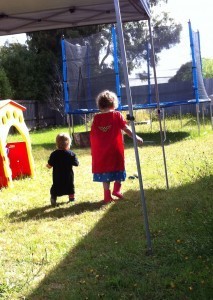 Raeli had her birthday a few days ago! We've had what feels like a whole week of birthday/holiday activities, culminating in the Big Superhero Party which felt like a crazed, sugary blur at the time, but people seemed to enjoy. Raeli informed me that it was even better than last year, largely because of the pinata (which from our POV was a dismal failure redeemed only by the fact that no one was actually hurt during the whole excruciating procedure). At the end, there were lollies, so no complaints from the kids.
Raeli had her birthday a few days ago! We've had what feels like a whole week of birthday/holiday activities, culminating in the Big Superhero Party which felt like a crazed, sugary blur at the time, but people seemed to enjoy. Raeli informed me that it was even better than last year, largely because of the pinata (which from our POV was a dismal failure redeemed only by the fact that no one was actually hurt during the whole excruciating procedure). At the end, there were lollies, so no complaints from the kids.
Apart from the change in theme, from fairies to superheroes, I had planned to run the party the same as last year: simple food involving opening packets, I don't make anything myself except the cake and fairy bread, sausages on the barbie for kids & parents alike, my Mum madly running the games (everyone needs a Glammer come birthday season) and no fuss. Naturally it got far more complicated than that, not least because, well, do we remember how last year I had a little 5 month old baby? THIS YEAR she's a running, jumping, bouncing, psyched up little dynamo, and it took the 15 or so adults at the party to keep track of her. I'm not used to a feisty baby. Raeli was energetic but not one for hurling herself off furniture. Jem topped off the party by eating everything. Seriously. All the things. Once the big kids had abandoned the picnic cloths and gone to play games, she plonked herself down and ate more than her own body weight in chips, cheezels, biscuits, watermelon and… oh, I don't even know. Hear that? That's the kind of mother I am. I have no idea what she ate. I just know that she looked really, really smug about it.
 (Jem's costume for the party, incidentally, was a black size 7 t-shirt with the Batman logo on it, which I picked up at Target and Raeli refused to wear because of her sixth sense that it was in fact a boy's t-shirt. Sigh. Still, it made an awesome mini-dress on my baby)
(Jem's costume for the party, incidentally, was a black size 7 t-shirt with the Batman logo on it, which I picked up at Target and Raeli refused to wear because of her sixth sense that it was in fact a boy's t-shirt. Sigh. Still, it made an awesome mini-dress on my baby)
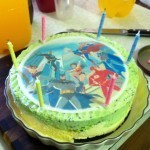 From my point of view, the highlight and most successful moment was the icecream cake, which I had made with minor help from Raeli. It was topped with a rice paper Justice League picture acquired from eBay, and had two litres of peppermint choc chip icecream and two of vanilla. Awesome. My honey was in charge of cutting the cake in question (in our household he is put in charge of anything I can categorise under "physics" which is a surprising amount actually) and did very well with managing the hungry hordes of children, and the select group among them who had very firm preferences as to which superhero they wanted to take a bite out of.
From my point of view, the highlight and most successful moment was the icecream cake, which I had made with minor help from Raeli. It was topped with a rice paper Justice League picture acquired from eBay, and had two litres of peppermint choc chip icecream and two of vanilla. Awesome. My honey was in charge of cutting the cake in question (in our household he is put in charge of anything I can categorise under "physics" which is a surprising amount actually) and did very well with managing the hungry hordes of children, and the select group among them who had very firm preferences as to which superhero they wanted to take a bite out of.
 Raeli got the bit with Wonder Woman on it, which involved quite complicated physics (SEE!) and meant she had to wait nearly to the end, thanks to WW being front and centre on the cake. She was very patient.
Raeli got the bit with Wonder Woman on it, which involved quite complicated physics (SEE!) and meant she had to wait nearly to the end, thanks to WW being front and centre on the cake. She was very patient.
I have been delighted by how she has bonded with her rather lovely Wonder Woman costume, since receiving it as a Christmas present. She often wears it just because, and I love that she will happily go off to the shops dressed as a superhero. I had thought all that random dressing up stuff was behind us, as she hadn't worn a fairy or mermaid outfit out in public for years, except for school events, parties and of course, Mummy's book launches.
She also got a trampoline for Christmas and I associate the Wonder Woman costume with all the bouncing. I particularly love that when asked to pose for a photograph, she will do a strong superhero stance, gauntlets crossed and biceps flexed.
Oh, I love my girl.
Can't believe she's six, really. Obviously we got here by the long route, and her sixness comes as less of a surprise to me than to those of our friends who don't see her every day. But she's so big now, and so formed. She has such strong opinions and preferences. She can delight and frustrate me within the span of thirty seconds or so. She has some incredibly powerful fears that have at times proven quite debilitating. But then I turn around, and she is displaying great strength, or caring, or even a little courage here and there.
She is very smart, especially with language, and picks up phrases and words to mull over. She is constantly asking me what things mean, and how things work (if it's Physics related she gets to wait for Daddy to come home!) and this year, this year is the year she really put together the whole reading thing, to the point that she can actually read whole books by herself. The gift she was most delighted by this year, amongst all the bling and furry animals and sparkly goodness, was a reading light shaped like a penguin, which aids her in her quest to Secretly Read Books After Lights Out. We are pretending to be very disapproving of this, which makes it even better!
Raeli has taken to the whole sister thing like a duck to water. She adores her Jem-Jem, and takes great pleasure in teaching her things, or discovering new things about her. Though she also appreciates the days when Jem goes off to daycare, and Raeli gets Mummy time to herself.
Which is WHY I was so delighted today when I tried to suggest to my editor that I take to the end of February for my Book 3 edits, which would give me a whole fortnight after school goes back to lay into them substantially, and she insisted I should take more time. So my deadline is 15 March, which means I actually get to spend the next few weeks of school holiday not feeling wracked with guilt about balancing work and motherhood. I get to play with my girls!
SCHOOL'S OUT FOR SUMMER!
January 20, 2011
Announcement: The Twelve Planets

Who Are the Twelve Planets?
Margo Lanagan, Lucy Sussex, Rosaleen Love, Tansy Rayner Roberts, Deborah Biancotti, Kaaron Warren, Cat Sparks, Sue Isle, Kirstyn McDermott, Narrelle M Harris, Thoraiya Dyer, Stephanie Campisi.
What Are the Twelve Planets?
The Twelve Planets are twelve boutique collections by some of Australia's finest short story writers. Varied across genre and style, each collection will offer four short stories and a unique glimpse into worlds fashioned by some of our favourite storytellers. Each author has taken the brief of 4 stories and up to 40 000 words in their own direction. Some are quartet suites of linked stories. Others are tasters of the range and style of the writer. Each release will bring something unexpected to our subscriber's mailboxes.
When Are the Twelve Planets?
The Twelve Planets will spread over 2011 and 2012, with six books released between February and November each year.
The first three titles will be Nightsiders by Sue Isle (March), Love and Romanpunk by Tansy Rayner Roberts (May) and the third collection will be by Lucy Sussex (July).
How to Receive the Twelve Planets
The Twelve Planets will be available for purchase in several ways:
Single collections will be priced at $20/$23 International each including postage.
A season's pass will offer the three collections of the season for $50/$65 International including postage and each sent out on release.
Full subscriptions to the series are $180/$215 International including postage and each sent out on release.
More information relating to upgrades, ebooks and distribution will be made available in due course.
===
Tansy's Note: I've discussed my collection on Galactic Suburbia before, but not on this blog. I didn't like to say anything until it was formally announced! But I'm supremely excited to be among such marvellous company in my fellow authors, as well as being very proud of Love and Romanpunk itself – the book that thumbs its nose at my PhD in Classics. It's a linked suite of four stories set in what I like to call the Agrippinaverse – and to know why I call it that, you're just going to have to read the book!

